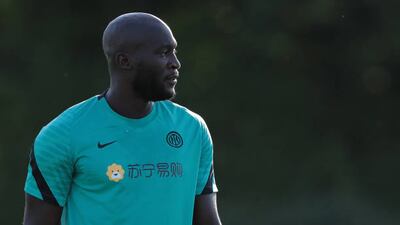The last time Romelu Lukaku struck a ball in competitive action for Chelsea it cost them a trophy. It was the 2013 Super Cup. Lukaku, the young substitute, took the last penalty in the shootout. Manuel Neuer guessed right. Bayern Munich lifted the silverware.
Lukaku was loaned out to Everton soon after and sold the following summer. That was his 15th Chelsea appearance and, while the majority were as a substitute, none brought a goal. It has been the anomaly in a remarkably productive career that, at the age of 28, has yielded 315 goals for his other clubs and his country.
It has long seemed that “the baby Drogba”, as he used to be nicknamed, and Chelsea have had unfinished business and not merely because Wednesday’s Super Cup game against Villarreal affords the chance for a cathartic and belated first goal.
Lukaku could have returned to Stamford Bridge in 2017 when Jose Mourinho stole a march on his old club by taking him to Manchester United instead. Alvaro Morata proved the consolation prize who ended up on the list of the expensive Chelsea strikers who justified neither their price tag nor their reputation: in that respect, at least, no one wants Andriy Shevchenko and Fernando Torres for company.
Lukaku seems a safer bet, even if a fee of £98 million may give Chelsea precious little resale value and, after signing him twice and selling him once, will take their net outlay on him to £90 million. He represents a guarantee of goals. Three players in this summer’s transfer market seemingly did but Harry Kane preferred City, and is trapped in limbo, while Borussia Dortmund have refused to sell Erling Braut Haaland, who seemed ideal for Chelsea.
But Lukaku it is. Chelsea’s top scorer in the Premier League last season was the penalty-taking regista Jorginho; in Thomas Tuchel’s otherwise hugely successful reign, Chelsea were outscored 52-25 by City in the top flight.
There was a glaring need for a finisher. Evidently neither Timo Werner nor Kai Havertz was expected to be clinical enough. Lukaku should be the spearhead who renders the false-nine strategy Plan B. He is the poacher who should appreciate the service from the phalanx of creators. He has scored goals with lesser supply lines. He got 30 last season, 34 the year before. He has 157 club strikes in six campaigns, even though only 15 came in his underwhelming sophomore year at Manchester United.
But a return to England represents a volte-face from Lukaku, who had pronounced himself happy to stay at Inter Milan. Perhaps even his exalted status there did not bring fulfilment: he was named Serie A’s Most Valuable Player as Inter won their first Scudetto in 11 years and Lukaku’s first trophy since his Anderlecht days. He will probably end up second only to Cristiano Ronaldo for international goals, certainly among European men, but recognition has been elusive: perhaps that lack of silverware is a reason why. During Euro 2020, Lukaku lamented how other forwards – Robert Lewandowski, Luis Suarez, Karim Benzema, Luis Suarez, Kane – are invariably described as world class when he is not.
He belongs in their bracket. Joining Chelsea may be an attempt to prove it, to repair the reputational damage from being discarded by United, to alter the impression his best feats have come for lesser sides or without achieving collective feats. He powered Inter to glory and was named in Euro 2020’s team of the tournament but he has felt football’s unfulfilled wanderer. But now the £98 million man will become the most expensive footballer ever, in terms of cumulative transfer fees. Both the balance sheet and the scoresheet have offered examples of Lukaku’s merits.

























